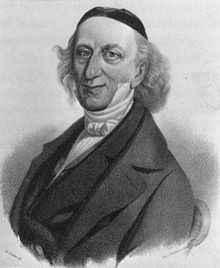Jakob Wilhelm Speyerer
Jakob Wilhelm Speyerer (also Jacob Wilhelm Speyerer ; born August 23, 1789 in Frankenthal ; † February 13, 1876 in Heidelberg ) was an entrepreneur, first mayor of Heidelberg, member of the state parliament and member of the budget committee of the second chamber of the Baden state assembly , member of the preliminary parliament and member of Baden Member of the Erfurt Union Parliament .
Life
He was the son of the wool manufacturer and merchant as well as court chamber councilor Johann Jakob Speyerer from Frankenthal and in 1815 entered the tannery on the Haarlaß near Ziegelhausen am Neckar , which his father had lost his property on the left bank of the Rhine as a result of legal disputes and the French Revolution , Acquired in 1893. The tannery founded there by the previous owner did not operate himself, but leased it to the Heidelberg tanner Johann Peter Werle. When his son and successor, Peter F. Wehrle, fell seriously ill, the young man from Speyer took over management alone in 1820. On May 19, 1817, he married his cousin Justine Dorothea Werle, the daughter of Johann Peter Werle from his marriage to a sister of Speyer's mother.
At a young age he began to be politically active. In 1815 he was one of the signatories of a petition to introduce a Baden meeting of estates. In 1822 he was elected to the Second Chamber of Baden for the first time in constituency 13 (Heidelberg) , but left again in 1823 after he had been one of the opponents of the military budget, because of whose intervention the chamber was temporarily dissolved. He was re-elected in 1831 in constituency 32 (Wiesloch and Neckargemünd). He belonged to the parliament again from 1831- 1833 , 1837-1838 , 1839-1840 , 1841 , 1845-1846 , 1847-1849 , 1850-1851 and 1851-1852 on. He belonged to the liberal wing, took part in debates on the state budget and campaigned for freedom of the press and autonomy of the communities as well as the emancipation of Jews .
In 1831 he also became second mayor, and from 1832 to 1840 first mayor of Heidelberg. There he made a contribution to the order of finances, the establishment of schools and the poor. In 1837 he was awarded the Knight's Cross by the Zähringer Löwen, and from that year he was again a member of the state parliament as a member of constituency 13 (Heidelberg). In 1840 he was confirmed in office as Mayor of Heidelberg, but did not take up office because of local political disputes.
In 1841, in solidarity with the liberal MPs Joseph Ignatz Peter and Adolf Sander , those affected by the holiday dispute , he returned his seat in the state parliament. The sale of the property in Neuenheimer Landstrasse 8 to the teacher (high school) and historian Georg Weber in the same year may be seen as a demonstrative withdrawal from Heidelberg. For constituency 29 (Bruchsal Land) he belonged again to the state parliament from 1845 to 1852 and dealt there again in particular with budgetary issues. Although he had demonstratively withdrawn from local politics in 1847 with the return of the honorary cup, he was re-elected as the first mayor of Heidelberg in 1849 after the turmoil of the revolution of the previous year and held the office again until autumn 1851. During both terms of office as mayor, he was also in each case to the Board of Directors of Heidelberger Sparkasse.
In 1850 he was a member of the Volkshaus of the Erfurt Union Parliament for constituency 11 (Bruchsal, Philippsburg, Wiesloch, Sinsheim, Neckarbischofsheim) , and from 1851 to 1852 he moved back into the Baden state parliament for constituency 13 (Heidelberg). The city guest house in Heidelberg on the Gaisberg, which he suggested, was named Speyerershof (also Speyererhof) after him in 1853 . In retirement he wrote the book The Fruit of My Reflection on Faith , a demythologization of the Christian religion in verse in the succession of the theologian and philosopher David Friedrich Strauss and his book The Life of Jesus, edited critically from 1835/36.
literature
- Herbert Derwein: Heidelberg in the pre- March period and in the revolution of 1848/49. A piece of Baden civil history. Verlag G. Koester, Heidelberg 1958, DNB 458757446 , p. 15-18 with ill., P. 21, p. 27-31, p. 36, p. 48, p. 54-56, p. 122f.
- Michael Bock: The Baden state parliament members from the district of Wiesloch 1819–1933. In: Wiesloch - Contributions to History. Vol. 1, Ubstadt-Weiher 2000, DNB 959533176 , pp. 147-149.
- Jochen Lengemann: The German Parliament (Erfurt Union Parliament) from 1850. (= publications of the historical commission for Thuringia. Large series 6). Urban & Fischer, Munich / Jena 2000, ISBN 3-437-31128-X , p. 297, p. 366.
See also
Web links
Individual evidence
- ↑ See lists of members of the preliminary parliament and the Fifties Committee .
- ↑ Jochen Lengemann: The German Parliament (Erfurt Union Parliament) from 1850. Urban & Fischer, Munich / Jena 2000, p. 297, p. 366.
- ↑ Cf. Norbert Brugger, 200 years of municipal self-government - success story and future model. Commemorative publication for the general assembly of the Baden-Württemberg City Council on October 23, 2008 in Baden-Baden. Baden-Württemberg City Council, Stuttgart 2008.
| personal data | |
|---|---|
| SURNAME | Speyerer, Jakob Wilhelm |
| BRIEF DESCRIPTION | Baden administrative officer and member of the state parliament |
| DATE OF BIRTH | August 23, 1789 |
| PLACE OF BIRTH | Frankenthal |
| DATE OF DEATH | February 13, 1876 |
| Place of death | Heidelberg |
